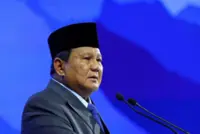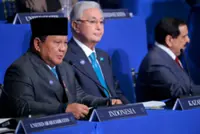BEKASI, Indonesia (The Straits Times/ANN): Former senior leaders of the now-defunct terror group Jemaah Islamiyah (JI) held a gathering in Bekasi, a satellite town of Jakarta, urging former comrades to stand down, turn themselves in and to contribute to peace and economic development in Indonesia.
Speaking via video conference, Abu Rusdan, a former JI leader arrested in 2021, told a packed room of about 400 former members on Sept 8: “Go ahead, turn yourself in. If you have any arms, surrender them (to the authorities). You will not be detained.”
His appeal was part of a nationwide outreach tour aimed at ensuring that former JI members do not regroup or join existing splinter groups, following the June dissolution of the terror group that was responsible for the 2002 Bali bombings.
Abu Rusdan is also a founder of the group.
Similar gatherings were previously held in other places such as Yogyakarta, Jambi on the western island of Sumatra, and West Nusa Tenggara province capital Mataram, according to the former JI leaders who organised the meeting with the support of Indonesia’s national police counter-terrorism squad, Detachment 88.
Police said on Sept 8 that all former JI members who turn themselves in will still be prosecuted according to their involvement, but would be given special consideration.
“Until now, there is no fatwa that says that Indonesia is taghut (the worship of false gods or idols, instead of Allah), and therefore must be attacked,” said Abu Rusdan, speaking while still imprisoned at the police headquarters detention facility in the capital.
Abu Rusdan, who was a JI chief between 2004 and 2007, also said that such beliefs had all this time been wrongly based on inaccurate teachings passed down for generations.
Senior JI leaders had announced the group’s dissolution at a June 30 event. In a video recording of that meeting, Abu Rusdan had said that JI’s senior council and the leaders of the group’s affiliated Islamic boarding schools had “agreed to declare the dissolution of the JI and return to Indonesia’s embrace”.
He made the statement alongside other key figures, including Para Wijayanto, one of the most wanted terrorists in South-east Asia, who was arrested in 2019 for recruiting militants and raising funds for terrorist organisations in Syria. The two are still serving time.
JI evolved from the Indonesian militant movement Darul Islam, established before the country’s independence in 1945, into an organisation with links to Al-Qaeda.
Formed in 1993 by Indonesian clerics Abdullah Sungkar and Abu Rusdan, JI – the South-east Asian affiliate of Islamist militant organisation Al-Qaeda – wanted to establish a conservative Islamic state in the region. Abdullah died in 1999.
The group was outlawed in 2008 after deadly attacks in the Philippines and Indonesia, including the bombings on the holiday island of Bali in 2002 that killed more than 200 people, many of them Australian tourists.
A concerted security crackdown and the authorities’ vigilance have since weakened JI, which has not staged a major attack in over a decade.
Among the former members at the Sept 8 gathering was Mr Yudi Anto, 42, a member from Cibitung in West Java province, who agreed with the decision to disband JI. He had joined JI 10 years ago.
He, like many others there, had travelled from nearby satellite towns, including Bogor and Depok, to attend the event on the border of the capital.
“We, jemaah (the congregation), must bring about manfaat (benefits) to the society,” Mr Yudi told The Straits Times, adding that perhaps members could still remain in contact and find a new moral purpose that veers away from the past terror activities.
Similarly, Mr Maman Suherman from Banten province, who had been with JI for seven years, was supportive of the group’s dissolution, saying that he would follow the direction of the former leaders. His reason being that Islam teaches its followers to respect and follow their leaders.
But the decision to disband has not been an easy pill to swallow for some, according to anecdotes shared with ST.
Some long-term JI members who had made extreme sacrifices, such as leaving their families for long periods to go into hiding or to carry out assignments, said they had needed some time to warm up to the news of dissolution.
Abu Fatih, another JI leader, said there are those who have not supported dissolution, including one person in West Nusa Tenggara province.
“We consider them as those being left behind, and who have not absorbed new information and thinking. We are confident they will one day support dissolution,” said Fatih.
Also speaking via video call from prison, former JI chief Para Wijayanto told attendees of the approach they needed to take to deal with JI’s problematic past.
“If we have an aching tooth, we see a dentist to have the cavity filled, but if the problem persists, we pull out the teeth so it won’t create any more problems. We eliminate it,” he said. - The Straits Times/ANN





